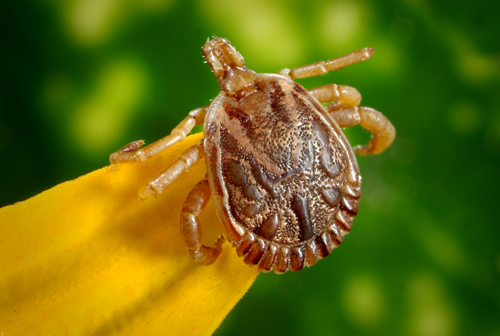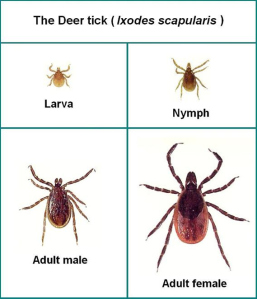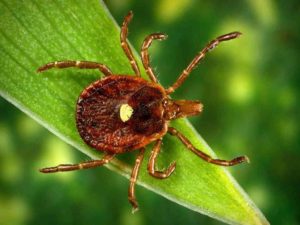Ticks are common in Central Mass, and most of our residents have come in contact with one at one time or another.
In many ways, ticks elude us. What do ticks look like? Do ticks have wings? Can ticks swim? Even though ticks are rampant in our area, many of us still have questions about tick habits and physical traits. Folks still wonder if they fly. How they survive winter. Here is a common list of tick questions and answers.

 What do ticks look like?
What do ticks look like?
Ticks are arachnids, just like spiders. This means they have four sets of legs. They are in the sub class Acari, along with mites. Their coloring can range from light gray-ish white, brown, black, yellow, and brownish-red. Ticks are a flat, oval shape when not engorged with a tasty blood meal.
 How big are ticks?
How big are ticks?
Ticks have three distinct life stages throughout their two-year life cycle. Larvae ticks are very small, and can be unnoticeable. In this stage of life, they are about the size of a grain of sand. In their next stage of life, nymph ticks have grown to the size of a sesame seed. Adult ticks are similar in size to an apple seed.
Do ticks have wings?
 Ticks do not have wings. They do not fly or jump. Ticks quest by attaching themselves to plants or limbs. They hold on to leaves and grass with two sets of their legs, and outstretch their other legs awaiting a host to pass. If you are wondering how ticks cover so much territory, it is because they are transported by their hosts – animals and humans. The sheer number of ticks in Central Mass might make it seem like they are fast travelers. This is untrue without a host. Ticks are just – everywhere!
Ticks do not have wings. They do not fly or jump. Ticks quest by attaching themselves to plants or limbs. They hold on to leaves and grass with two sets of their legs, and outstretch their other legs awaiting a host to pass. If you are wondering how ticks cover so much territory, it is because they are transported by their hosts – animals and humans. The sheer number of ticks in Central Mass might make it seem like they are fast travelers. This is untrue without a host. Ticks are just – everywhere!
Can ticks swim?
This is an interesting question, and a common one! While ticks do not swim, they can survive submerged in water for two to three days. Do not try to kill ticks by drowning them in the bathtub or swimming pool. The only surefire method of destroying a tick in water, is by flushing them down the toilet.
Also read: What repels ticks naturally?
Do ticks die in the winter?
 No, they do not! Even in cold Central Mass winter temperatures, ticks are resourceful and will survive in nests of other animals or even underground. Ticks will lie dormant in winter, waiting for warm weather to return, so they can invade our favorite outdoor spaces.
No, they do not! Even in cold Central Mass winter temperatures, ticks are resourceful and will survive in nests of other animals or even underground. Ticks will lie dormant in winter, waiting for warm weather to return, so they can invade our favorite outdoor spaces.
 Can a tick bite kill you?
Can a tick bite kill you?
Tick bites can result in illnesses, such as Lyme disease, and Rocky Mountain spotted fever, which can make us very sick. Powassan virus is another tick-borne illness, which can cause a deadly brain infection. Even people, who have lived through Powassan can remain ill, or even die from the effects. Recently in North Carolina, former US Senator, Kay Hagan, died three years after contracting Powassan, which resulted in Encephalitis. She remained ill for three years before passing away.
Ticks are not just a nasty nuisance in Central Massachusetts. They are effective questing insects, who live for their next blood meal. The single best way to protect your family is with year-round Central Mass tick protection, which includes tick tubes in the winter.